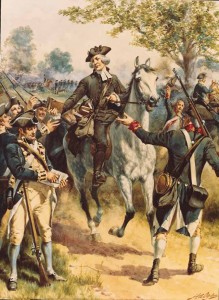
On this day, February 7, 1776, General George Washington notifies his troops of a new policy regarding chaplains’ pay. He’d advocated for better treatment of his chaplains, and he’d succeeded!
Shortly after Washington assumed command of the American army during the summer of 1775, the Continental Congress approved its first act regarding chaplains. This act set chaplains’ salaries at $20 per month just above that of lieutenants. Washington was unimpressed. He wrote the President of Congress, noting that the pay was “too Small to encourage men of Abilities.” He asked that a way be found to increase chaplains’ salaries.
Congress approved Washington’s request. It passed an act providing for the appointment of one chaplain to every two regiments. The chaplains had more responsibility, but their pay was also increased. Instead of $20 per month, they were to receive a little more than $33 per month. Washington announced the change on February 7, 1776.
After a few months, Washington decided that the system (unfortunately) did not work for logistical reasons. If regiments were separated due to the demands of war, one regiment might find itself without a chaplain for a while. Washington wrote Congress again. He asked that chaplains be assigned one per regiment, with a salary “competent to their support.”
Congress initially agreed, but the new policy did not last. Eventually, fiscal concerns caused chaplains to be assigned one per brigade. A brigade was a much larger unit of the army; it could be composed of several regiments. In other words, there were fewer chaplains, overall, in the army.
Washington objected again. Interestingly, his main concern was for religious liberty. He wanted many chaplains of a variety of faiths. If there were fewer chaplains overall, then, by definition, there were fewer choices for his men. They were more likely, he wrote Congress, to be compelled “to a mode of Worship, which they do not profess.” Washington preferred the old system, with more chaplains and a greater likelihood that the men could have “a Chaplain of their own religious Sentiments.”
Perhaps what is most interesting about all of these events is the great importance that Washington placed upon the presence of chaplains in his army. He thought they served a valuable function, and he advocated for them consistently. Remember that Washington often faced shortages of supplies and funds. Yet he thought it important to spend some of these valuable funds on chaplains.

1 Comment
Comments are closed.